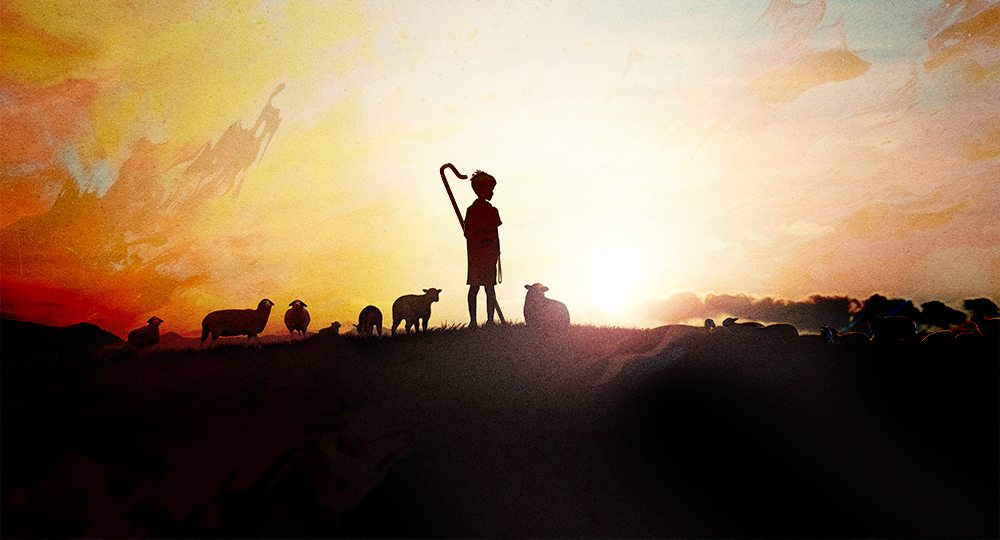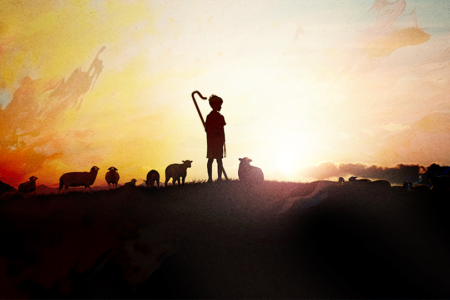A Boy Named David
A look at the shepherd destined to become Israel’s king
My first encounter with King David came in a Sunday-school kindergarten class. We learned a peppy little song called “Only a Boy Named David,” written by Arthur Arnott in 1931. It begins like this: “Only a boy named David, only a little sling, only a boy named David, but he could pray and sing.”
Although most of the lyrics revolve around David taking on the Philistine giant Goliath, they nevertheless taught me several important aspects of the young shepherd’s life: He loved God and was a brave yet sensitive soul.
Born in Bethlehem into the tribe of Judah, David was the youngest of eight sons. His father was Jesse; and his great-grandmother was Ruth the Moabitess about whom the book of Ruth is written.
David also had two sisters: Zeruiah, the mother of David’s military chieftain, Joab; and Abigail (1 Chr. 2:16), the mother of Amasa, whom David’s son Absalom appointed head of his army when he rebelled against David.
As the youngest son, the lowly job of shepherding the family sheep fell to him. Shepherds in those days had no status and were considered dreamers with vivid imaginations. They spent their days alone, watching and protecting animals that most people considered stupid.
But it was in this role that David likely developed his close relationship with God. He trusted God to protect both him and the sheep and spent many hours writing songs, praying, and praising the Lord, who probably was his only companion.
In the fields, the young shepherd learned from the Great Shepherd—who was his Rock, Refuge, Helper, and Salvation; and he developed great faith in the God of Israel.
Anointing the Shepherd
The account of David’s life begins in 1 Samuel 16, when God told the prophet Samuel that He rejected King Saul because of Saul’s disobedience: “Fill your horn with oil and go; I am sending you to Jesse the Bethlehemite. For I have provided Myself a king among his sons” (v. 1).
Humanly speaking, David seemed the least likely choice for king. But God’s method of evaluation differs from ours. Even Samuel turned out to be wrong. As Eliab, Jesse’s eldest son, came forward, Samuel thought, “Surely the LORD’s anointed is before [me]” (v. 6).
But God told him, “Do not look at his appearance or at his physical stature, because I have refused him. For the LORD does not see as man sees; for man looks at the outward appearance, but the LORD looks on the heart” (v. 7).
So began the parade of seven of Jesse’s sons, all of whom God rejected. Finally, Samuel asked Jesse, “Are all the young men here?” (v. 11). The youngest was considered so insignificant no one bothered to call him to the house. He was still tending the sheep.
“Bring him,” Samuel said (v. 11). “Now [David] was ruddy, with bright eyes, and good-looking. And the LORD said, ‘Arise, anoint him; for this is the one!’” (v. 12).
So, Samuel anointed the young shepherd with oil; “and the Spirit of the LORD came upon David from that day forward” (v. 13). At the same time, “the Spirit of the LORD departed from Saul, and a distressing spirit from the LORD troubled him” (v. 14).
In those days, the Holy Spirit did not reside in individuals as He does in today’s Church Age. Bible scholar Dr. Charles Ryrie explained, “The presence of the Holy Spirit in the O.T. [Old Testament] was selective and temporary, while today it is universal and permanent among believers.”1
Saul’s acute distress prompted his servants to suggest that music might help him. So, a search ensued to find a skillful harpist. In God’s divine plan, David was chosen to play for Israel’s troubled king.
At first, Saul “loved him greatly” (v. 21). David’s music “refreshed [Saul], . . . and the distressing spirit would depart from him” (v. 23). But Saul’s love was short-lived.
After David bested the entire Israelite army by killing the Philistine giant Goliath (see “David and Goliath,” page 30), he rose to prominence; and Saul began to fear him. Though Saul gave David his daughter Michal in marriage, it didn’t take long before he wanted to make sure David would never get the kingdom.
David and Jonathan
Michal loved David (1 Sam. 18:20) and protected him, as did his godly brother-in-law, Jonathan. Scripture says, “The soul of Jonathan was knit to the soul of David, and Jonathan loved him as his own soul” (v. 1).
Some liberal scholars have tried to make this text say far more than it does. The key here is that David and Jonathan were extremely close, as are many brothers; and nothing indicates any impropriety. Jonathan, probably knowing David would someday be king, made a covenant with him:
“You shall not only show me the kindness of the LORD while I still live, that I may not die; but you shall not cut off your kindness from my house forever, no, not when the LORD has cut off every one of the enemies of David from the face of the earth.” So Jonathan made a covenant with the house of David (20:14–16).
As Saul grew more obsessed with jealousy, David’s relationship with him deteriorated; and David became convinced his father-in-law wanted to kill him. Jonathan, however, thought better of his father. So, the two devised a plan to determine the truth.
David was due to dine at the king’s table. But he would skip dinner and let Jonathan explain his absence. If Saul accepted his absence amiably, all was well. They also devised a signal. David would hide in the field, and Jonathan would shoot three arrows. David would learn whether to flee or stay based on where Jonathan told his servant to look for the arrows (vv. 18–22).
David, of course, was correct. When Jonathan explained David’s absence, Saul exploded: “You son of a perverse, rebellious woman! . . . As long as the son of Jesse lives on the earth, you shall not be established, nor your kingdom. Now therefore, send and bring him to me, for he shall surely die” (vv. 30–31). Then Saul hurled a spear at his own son “to kill him” (v. 33).
Angry, Jonathan stormed out and warned David. David “fell on his face to the ground, and bowed down three times. And they kissed one another; and they wept together, but David more so” (v. 41).
Then Jonathan reminded David of their covenant: “Go in peace, since we have both sworn in the name of the LORD, saying, ‘May the LORD be between you and me, and between your descendants and my descendants, forever’” (v. 42).
Then they parted; and there is no indication they ever saw each other again. But many years later, King David, ever loyal, with a sensitive shepherd’s heart, sought out Jonathan’s sole living son, Mephibosheth, to show him kindness.
David was not perfect. He was a sinner, like all of us. But he loved the Lord and never wavered in his devotion to Him. The God of Israel, with whom he communed in the shepherds’ fields, was the God he worshiped his entire life. David extolled Him as “a shield for me, my glory and the One who lifts up my head” (Ps. 3:3) until the day he took his final breath on Earth and opened his eyes in the presence of the Lord he loved.
ENDNOTE
-
-
- Charles C. Ryrie, The Ryrie Study Bible, NKJV (Chicago, IL: Moody Press, 1985), 440, n 1 Samuel 16:14.
-
Photo: Adobe Stock








